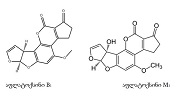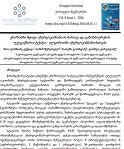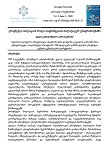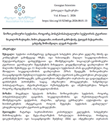Study of the Intensity of the Emotional State of Anxiety in Animals under Conditions of Zoosocial Isolation of Varying Durations
Downloads
It is known that a general sensory stimulus creates a certain level of excitation of the nervous system, which is referred as "general tone". Making an error-free decision requires creating an optimal tone. Extremely high or low tone contributes to an increase in errors and the development of negative emotions that reduce the quality of work performance. One such factor is social isolation. Social deprivation is one of the risk factors for the formation of psychogenic stress. Anxiety is an emotional state characteristic of humans and mammals. According to Aaron Beck, an American psychiatrist, anxiety is a completely normal emotional state. However, under the influence of a stressogenic factor anxiety becomes stronger or weaker, which is a prerequisite for pathology. Therefore, the study of the issue has a great practical significance. The research aimed at studying:
- the intensity of the emotional state of anxiety on an animal model under conditions of zoosocial isolation of varying durations;
- the influence of the emotional state of anxiety caused by zoosocial isolation of varying durations on the cognitive functions of animals.
Research material and methods. The experiment was carried out in the educational and experimental laboratory of physiology of the Faculty of Biology of Akaki Tsereteli State University. Adult male white rats were chosen. Two behavioral tests were used to test the anxiety: the first one, the so-called “punished water drinking” (passive avoidance), and the second test - "elevated plus maze". Based on the research objectives, the experimental animals - white laboratory rats were divided into series and groups (6 series, 18 groups), the number of animals in the group was n=4. With the aim of social isolation 3-week-old pups were selected for the first, second, fourth and fifth series of tests. They were separated from their mothers and placed individually in isolation. For the third and sixth series, we used community-raised animals, and the data obtained from them were used for a control. Statistics: Student's t-test was used to process the obtained results. Obtained results: the emotional state of anxiety is intensely manifested in conditions of long-term zoosocial isolation if the isolation begins from an early stage of individual development; The course of the emotional state of anxiety is wave-like which means that initially the intensity of the anxiety state increases, after a certain period of time it decreases and, finally, it goes up again. The decrease in the intensity of anxiety could be determined by the protective adaptation mechanisms of the body and the phenomenon of hormesis. Negative (aversive) memory is directly related to low- and very high-intensity anxiety, both of which impair memory. The emotional state of anxiety caused by prolonged zoosocial isolation manifests itself with less intensity in animals raised in rich environments (community). And individuals who grew up in poor environments are characterized by increased anxiety in conditions of prolonged zoosocial isolation, whereas in conditions of short-term zoosocial isolation anxious behavior is weakly manifested and its formation is rectilinear.
Downloads
ნებიერიძე ნ. - ემოციური მდგომარეობი გავლენა მეხსიერებაზე. საკანდ. დის. ავტორეფერატი,თბილისი,2002.
რენიკო საკანდელიძე, იზოლდა ლომსიანიძე, ერეკლე ჯულაყიძე, ხათუნა რუსაძე -შფოთვითი ქცევის შესწავლა წყალბადის ზეჟანგით გამოწვეული ოქსიდაციური სტრესის პირობებში. ჟურნალი „ქართველი მეცნიერები“, ტ.4; №5, 2022წ. გვ.97-107;
შალამბერიძე ა., საკანდელიძე რ., ქორელი ა. - ცენტრალური მუსკარინული აგონისტისა და ანტაგონისტის გავლენა ვირთაგვის ქცევაზე ამაღლებულ ჯვარედინ ლაბირინთზე. საქ. მეცნ. აკად. მაცნე, ბიოლ. სერია - A, 2003, ტ. 29,755-760.
ხახანაშვილი მ. - ინფორმაციული სტრესი; საქართველოს მეცნიერებათა ეროვნული აკადემია. თბილისი, 2008.
American Psychiatric Association: Diagnostic and statictical manual of mental disorders – TR, Washington, DC, 2000.
Beck A.T. – Cognitive Therapy and the emotional Disorders. New York: Meridian, 1976.
Cruz A.P.M; Frei F; Graeff F.G. – Ethopharmacological analysis of rat behavior on the elevated plus-maze. Pharmacol. Biochem. Behav; 1994, 49, 171-176.
Lane R.D; Nadel L. – Cognitive Neuroscience of Emotion. New York: Oxford University Press, 2000.
Nebieridze N., Koreli A. – Effect of galanthamine on perfotmance of the step-trough passive avoidance task in the rats. Proc. Georgian Acad. Sci.,Boil., Ser., 1998. 24. 287-291.
Rolls E.T. – The Brain and Emotion. Oxford: Oxford University Press, 2001.
Townend J. – Practical Statistics for Environmental and Biological Scientists. .
hichester, England: John Willy and Sond, 2003
Shalamberidze A., Sakandelidze R. – Comparative study of central and peripheral anticholinestherase drugs in the passive avoidance test in the rats. Bull. Georgian Acad. Sci., 2002, V. 165,544-546.
Scuire L.R., Bloom F.E., McConnel S.K., Roberts J.L., Spitzer N.C., Zigmord M.J. (Eds.) – Fundamental Neuroscience, second edition. London: Academic Press,2003
Copyright (c) 2023 Georgian Scientists

This work is licensed under a Creative Commons Attribution-NonCommercial-NoDerivatives 4.0 International License.


























































































































































































































